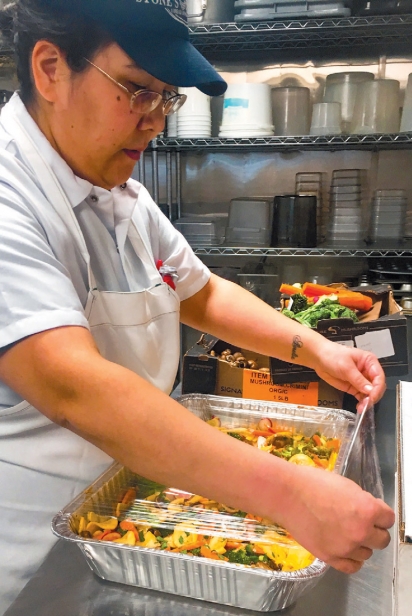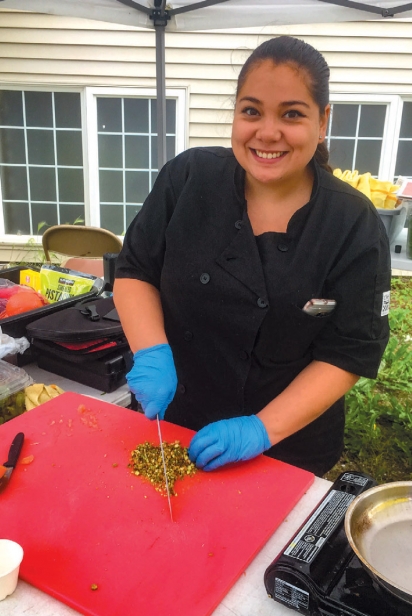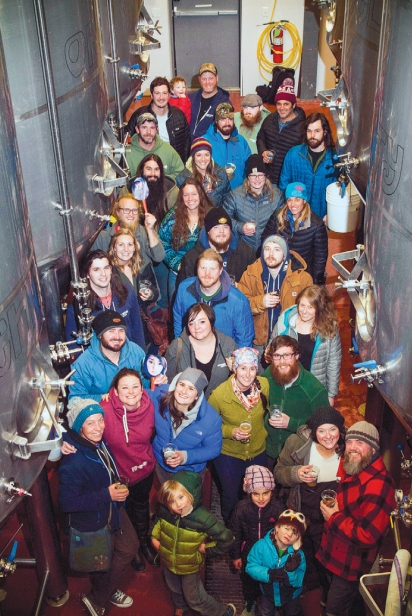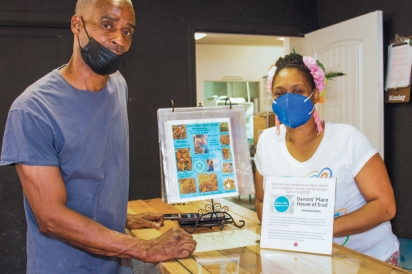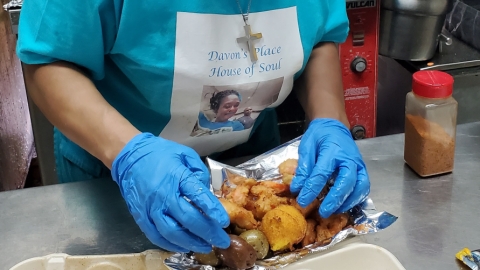Ripe for Change
Alaska’s labor shortage offers a chance to redefine workforce development
As Alaska’s economy began to reopen this spring, restaurants welcomed customers who had been long missed during pandemic closures. Hopes in April were high that the country was rebounding. By early May, they were dashed by jobs numbers depicting what would soon be deemed a labor shortage. Some blamed stimulus checks and unemployment benefits for keeping workers away, while others said the onus was on employers to re-evaluate wages and benefits as people reassess what they want to do for work in a post-pandemic world.
In April, the state had recovered nearly 40 percent of jobs initially lost during the same month in 2020 due to COVID-19, according to the Alaska Department of Labor and Workforce Development. Data from the department show that when the pandemic first hit, leisure and hospitality lost nearly 15,000 jobs from previous-year levels. A year later in May 2021, the DOL estimated there were nearly 29,000 jobs in the leisure and hospitality sector, a 26 percent increase over job numbers in 2020. While promising, employment in the sector was still lagging at 8,400 fewer jobs in April and 9,900 fewer in May when compared to the same months in 2019.
Alaska’s hospitality sector is seemingly on the mend, but the pandemic compounded problems the industry at large was already grappling with: trouble hiring and retaining qualified staff for employers, and, for employees, issues of low wages, few benefits, and tough working conditions.
“Even prior to the pandemic, the Alaska hospitality industry’s primary challenge...has been finding and retaining a reliable workforce,” Sarah Oates, President and CEO of the Alaska Cabaret, Hotel, Restaurant & Retailers Association, wrote in a letter published in the May/June issue of Alaska CHARR magazine. “This has been exacerbated by COVID-specific factors including increased unemployment insurance benefits for months on end, public hostility toward workers enforcing mitigation procedures, employment insecurity due to shutdowns and restrictions, and health concerns of employees.”
Anecodotal reports from employers, which have been widely cited by Republican lawmakers, say enhanced unemployment benefits are keeping people from working. Democrats disagree, saying other factors like lack of adequate childcare make it hard to find workers. Economists are divided, both on whether benefits aggravated the labor shortage and on the true impact of supplemental benefits.
There are no simple solutions for the complex, pervasive workforce problems facing the industry, Oates continued. The organization has launched an industry job board to help connect those looking for work with opportunities in the hospitality industry, in addition to education and training programs.
From School To Work
While on-the-job-training can be done, many working kitchens look for those who already have hospitality or kitchen experience.
Culinary school programs, which can cost tens of thousands of dollars at private institutes around the country, are one way into the industry. Closer to home, the University of Alaska Anchorage offers a handful of certificate, associate, and bachelor degree paths in culinary arts, baking and pastry arts, and hospitality administration. While more affordable, in-state higher education options can still be a significant financial hurdle for people looking to transition careers. The barriers to work are even higher for people overcoming homelessness, people who have been formerly incarcerated, or those working through mental health or substance use issues.
In Fairbanks, the Stone’s Throw culinary program grew out of a recognition there were obstacles to training and employment in their community. The free 12-week training, held twice a year, aims to help job seekers find and keep a job in the food sector.
“No one rises out of poverty in a vacuum,” Executive Director Hannah Hill said.
A modified version of the program is held for teens who are incarcerated, so they can attain ServSafe certification and job skills to be on level footing with peers when they re-enter their home communities.
Criminal justice advocates applaud programs that assist formerly incarcerated people with re-entry into the workforce, but have concerns that the hospitality industry can sometimes challenge employees due to its hours, proximity to alcohol, and high-stress environment. Hill said that’s why Stone’s Throw is a rounded program that offers “soft skills” in addition to technical training. Classes include learning how to deal with workplace stress, how to talk honestly about one’s story of self, and how to identify support systems and set boundaries.
The program is a joint venture between Bread Line and Catalyst Kitchens, a Seattle-based initiative of FareStart that focuses on training individuals facing barriers to employment in the food service industry. It’s led by chef instructors Marisa Pena and Liann Peryea. Pena, whose background includes work in high-end Chicago restaurants, said she’d like to see the trend of smaller, locally owned restaurants continue as they stimulate the economy and create welcoming spaces.
“This is the hospitality industry, but the workplace isn’t necessarily hospitable some of the time. The good thing I have learned from possible employer partners is that they are recognizing that the workplace is changing, the environment is changing, people’s attitudes are changing,” Pena said. “There has been a lot of positive reactions to those changes—wanting to get more training to be more trauma-informed and accepting of everyone’s different backgrounds.”
The program has a 100 percent employment rate at the time of graduation, but Hill said the more telling statistic is the 85 percent employment rate six months after graduation. Applications are taken on a rolling basis and can be obtained by contacting info@breadlineak.org or calling 907-452-1974.
Making Space: Correcting Entrepreneur Inequities
Access to capital can be another overwhelming roadblock to starting a food business. Working capital in particular is critical to many successful endeavors but it’s often not available to food entrepreneurs.
Authors of a 2019 white paper from the Council of Development Finance Agencies wrote, “Significant financial barriers limit the growth and evolution of work in the food system, yet this arena holds great economic and community development potential.” They went on to state, “...investment in the food system is focused on philanthropic grants, government subsidies, investor tax credits, and limited lending with high-risk loan funds. Traditional development finance tools, such as bonds, tax increment finance, and revolving loan funds, are seldom used in food system finance despite the opportunity to do so.”
In light of this, the surge of temporary pop-up restaurants and ghost kitchens across the country is understandable. The National Restaurant Association’s Restaurant Industry 2030 report lists “virtual restaurants” and “cloud kitchens”— placeless restaurants that operate from a central kitchen for delivery via online or app ordering—as a disruptor to watch for in coming years. These can be ways to test a concept or launch a new menu with small potential for loss and creating potential for growth. The ephemeral nature of pop-ups can lead to higher check averages (customers don’t want to miss an opportunity to try something) and deeply devoted fan bases built from social media and online hype.
In South Anchorage, a guest chef café has served as the testing ground for cooks working to hone their skills and build a clientele. Nestled within Anchorage re:MADE, a market for local artists to sell upcycled products, the Gathering AK café serves as an incubator for start-ups or additional space for food truck operators. Chefs rotate Monday through Saturday to offer a variety of fare. After applying and being accepted into the incubator program, a chef or baker develops their weekly menu and operates the café, while learning business skills like social media promotion for their business.
“For me, this place gives me a start until I can get my own restaurant— and I will one day. In the meantime, I don’t have to put my dreams on hold,” said Khanesia Allen, who operates Davons’ Place House of Soul from the guest chef café several days a week.
Anchorage re:MADE founder Patti Buist said she hopes the commercial space and support offered by Gathering AK help guest chefs like Allen to outgrow the space.
When Workers Are Owners
Consumer spending on alcohol skyrocketed in the spring of 2020. According to a Nielsen analysis published in May of last year, alcohol sales from brick-and-mortar storefronts were up 21 percent in March and April 2020 and online sales leapt 234 percent in the same time period.
The Brewers Association reported the craft beer industry slowed in 2020, perhaps unexpected considering the increase in alcohol consumption by consumers. The trade organization estimated small and independent brewers produced 9 percent fewer barrels of beer last year than in 2019. Data also indicate small brewing jobs declined nationally by 14 percent.
Those statistics feel familiar to Denali Brewing Company founding partner and CEO Sassan Mossanen. “It really felt for us like we had the reset button hit and we went right back to year one,” he said. “You know, we’ve been doing this for 12 years and all those gains that we’d had [felt lost]. Our restaurant sales were significantly down, down enough that we qualified for payroll protection.”
He said the company’s structure was part of what helped them get through. About five years ago, Denali Brewing became employee owned through an employee stock ownership plan, commonly referred to as an ESOP. The process was years in the making, but Mossanen said it was an important project for him personally.
“There’s no doubt our mission statement and core values helped us in the last year,” said Mossanen. Denali Brewing operates year-round, giving its employees an option for winter work in a community that is reliant on summer tourist traffic. When the company received Paycheck Protection Program benefits, they paid it out to employees.
Breweries are manufacturers at the end of the day, Mossanen said, and manufacturing lends itself well to the ESOP model. It could also be a good fit for restaurants, as anecdotally Mossanen has seen unanticipated levels of interest—and retention—among staff in the restaurant arm of the company.
“This was something that is really outside of the norm for what you’d expect for retail, service sector people to be getting. And because it seemed so out of the norm to them, it really piqued their curiosity and they really started to see the value in it,” he said. Mossanen added that people in the retail service industry may be wildly surprised by how beneficial the culture of ownership and an ESOP can be in this environment, but he recommends those who are interested to do due diligence when deciding if employee ownership is a good fit.
Shifting to this model is not without costs; there are annual and administrative fees, in addition to legal and financial costs, if needed, to adjust the corporate structure. For Mossanen, those costs are outweighed by what is gained through a culture of ownership that has led to more safety, efficiency, and staff retention when employees have a stake in the company’s success.
“Part of the ESOP culture is that I don’t look at it as my company and I don’t refer to it that way. When an employee says, ‘Hey, Sassan, I love your beer,’ I say, ‘No, it’s our beer.’”
While the ESOP helps retain employees in the long-term, Mossanen said one of the most lucrative aspects for getting workers in the door is upping the base pay for positions. When interviewed in early summer, Mossanen said he needed to hire for about 20 positions at the restaurant and several on the brewing side of the company.
“We are suffering from one of the most significant labor shortages we’ve had in my entire business life. I’ve never needed so many employees. The customers are there and we’re having a difficult time providing the level of service,” he said. The restaurant has had to reduce hours and restrict its seating area while they continue to recruit and train staff for the busier summer season.
Other companies were offering signing or end-of-season completion bonuses to entice job seekers. Mossanen said Denali Brewing does pay out bonuses to employees but that all good options for recruiting staff were on the table.
In late May President Joe Biden signed the Alaska Tourism Restoration Act that allows cruise ships to bypass docking in Canada and sail straight from Washington to Alaska, a stopgap while Canada has barred cruise traffic until 2022. It has been lauded as a hopeful sign for the summer season in Alaska, particularly in hard-hit areas of Southeast Alaska that struggled after 2020 sailings were canceled.
“The Alaska Delegation has worked for months to try to find opportunities to provide a safe path forward for Alaskans—to help salvage what is left of the 2021 tourism season. Together, with the support of so many Alaskans, there is now a light at the end of a long, dark tunnel,” said Senator Lisa Murkowski.
Many in the hospitality industry are cautiously optimistic about the future, hopeful the pandemic tide has turned. After months of required resilience, the labor shortage is on the surface a challenge, but one that could offer Alaska’s food businesses an opportunity to radically shift the future of workforce development.



